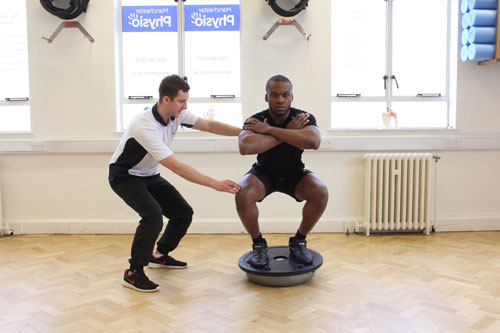Struggling with injuries or movement limitations? Missing out on quality of life due to chronic pain? We’ve got you covered! It’s time to trust the experts at Glenridding Physio – our experienced physiotherapists are here to help you get back on track and achieve optimal physical health.
WHAT IS PHYSIOTHERAPY?
Physiotherapy, also known as physical therapy, is a healthcare profession that uses physical techniques to help people recover from injuries, disabilities, or chronic conditions. Physiotherapists are trained healthcare professionals who specialize in assessing and treating problems related to the musculoskeletal, neurological, respiratory, and cardiovascular systems. Physiotherapy aims to improve a person’s movement, function, and overall quality of life. It involves the use of various techniques such as exercise therapy, manual therapy, electrotherapy, and other modalities to reduce pain, improve strength, mobility, flexibility, coordination, and balance. The goal of physiotherapy is to help individuals regain their independence and achieve their maximum physical potential.
There are several methods of physiotherapy treatment that a physiotherapist may use to help their patients recover from an injury, disability, or chronic condition. Some common methods include:
- Exercise therapy: This involves using specific exercises to help improve a person’s strength, flexibility, mobility, and balance. Exercises may include stretching, resistance training, and cardiovascular exercises.
- Manual therapy: This involves hands-on techniques such as massage, joint mobilization, and manipulation to help reduce pain, improve mobility, and restore function.
- Electrotherapy: This involves the use of electrical energy to stimulate muscles or nerves. Examples of electrotherapy include ultrasound, TENS (transcutaneous electrical nerve stimulation), and laser therapy.
- Heat or cold therapy: This involves the application of heat or cold to help reduce pain and inflammation. Examples include ice packs, hot packs, and paraffin wax.
- Education and advice: Physiotherapists may provide education and advice on how to manage symptoms, prevent future injuries and maintain overall health and well-being.
- Assistive devices: Physiotherapists may also recommend the use of assistive devices such as crutches, braces, or orthotics to help improve mobility and function.
The specific treatment method used will depend on the patient’s condition, their individual needs, and the goals of their physiotherapy program.



WHAT SHOULD YOU EXPECT DURING YOUR INITIAL PHYSIOTHERAPY CONSULTATION?
During an initial physiotherapy consultation, the physiotherapist will gather information about the patient’s medical history, current symptoms, and any relevant lifestyle factors. The goal of the consultation is to gain a better understanding of the patient’s condition and develop a personalized treatment plan.
Here are some things to expect during an initial physiotherapy consultation: Medical history and physical examination, Discussion of symptoms and goals, Treatment plan, Education and advice & Follow-up appointments.
We are happy to answer all your questions about the treatment plan during the consultation visit. If you are satisfied with the treatment plan, we may begin treatment the same day.
HOW OFTEN WILL I NEED PHYSIOTHERAPY TREATMENTS AND SERVICES?
The frequency of physiotherapy treatments and services can vary depending on the individual’s condition, the severity of the injury or condition, and the goals of the treatment plan. Generally, the physiotherapist will recommend a treatment schedule based on the patient’s needs and goals.
At the beginning of the treatment, it is common for patients to receive physiotherapy treatments several times a week. As the patient progresses and their condition improves, the frequency of treatment may be reduced. The physiotherapist will work with the patient to determine the appropriate frequency of treatments based on their progress. In some cases, patients may also benefit from ongoing maintenance physiotherapy to prevent future injuries and maintain their physical function and mobility. This may involve periodic appointments with a physiotherapist to assess the patient’s condition and provide ongoing support and advice.
HOW DOES PHYSIOTHERAPY TREATMENTS AND SERVICES BENEFIT ME?
Physiotherapy treatments and services at Glenridding Physio can provide many benefits for individuals with injuries, disabilities, or chronic conditions. Some of the main benefits of our physiotherapy services include:
- Pain relief: Physiotherapy can help to reduce pain and discomfort associated with injuries or chronic conditions, such as back pain, joint pain, and muscle strains.
- Improved mobility and function: Physiotherapy can help to improve mobility, range of motion, strength, and flexibility, allowing individuals to perform daily activities more easily and with greater independence.
- Prevention of further injury: Physiotherapy can help to identify and address underlying issues that may lead to further injury or complications, such as poor posture, weak muscles, or joint instability.
- Enhanced performance: Physiotherapy can help athletes and individuals who are physically active to improve their performance and prevent injuries, by focusing on specific areas of strength and conditioning.
- Better quality of life: Physiotherapy can help individuals to regain their independence, participate in daily activities, and enjoy a better quality of life overall.
- Non-invasive approach: Physiotherapy treatments and services are generally non-invasive, meaning they do not involve surgery or medication, and can be used as a safe and effective alternative or complement to other medical treatments.
WHAT CONDITIONS CAN BE TREATED USING PHYSIOTHERAPY TREATMENTS AND SERVICES?
Physiotherapy can be used to treat a wide range of conditions, injuries, and disabilities. Some of the common conditions that can be treated using physiotherapy treatments and services include:
- Musculoskeletal injuries: This includes conditions such as back pain, neck pain, shoulder pain, sprains, strains, and fractures.
- Neurological conditions: This includes conditions such as stroke, multiple sclerosis, Parkinson’s disease, and spinal cord injuries.
- Cardiovascular conditions: This includes conditions such as heart disease, stroke, and pulmonary disease.
- Respiratory conditions: This includes conditions such as asthma, emphysema, and chronic obstructive pulmonary disease (COPD).
- Women’s health issues: This includes conditions such as pelvic pain, incontinence, and prenatal and postnatal care.
- Sports injuries: This includes conditions such as sprains, strains, and fractures, as well as overuse injuries and concussion management.
- Chronic pain: This includes conditions such as fibromyalgia, arthritis, and chronic headaches.
- Balance and coordination issues: This includes conditions such as vertigo, dizziness, and balance disorders.
- Post-surgery rehabilitation: This includes conditions such as joint replacements, ligament repairs, and spinal surgeries.
Overall, physiotherapy can be used to treat a wide range of conditions, injuries, and disabilities, and can help individuals to improve their physical function, reduce pain, and achieve a better quality of life.
WHY SHOULD I CONSIDER PHYSIOTHERAPY TREATMENTS AND SERVICES TO OTHER OPTIONS?
Physiotherapy treatments and services can provide several benefits that may make it a preferred option over other treatments for certain conditions. Here are some reasons why you may want to consider physiotherapy:
- Non-invasive: Physiotherapy treatments and services are generally non-invasive, meaning they do not involve surgery or medication, and can be used as a safe and effective alternative or complement to other medical treatments.
- Personalized approach: Physiotherapy treatments are tailored to the individual’s specific needs, goals, and condition, and are designed to address the root cause of the problem rather than just treating symptoms.
- Focus on prevention: Physiotherapy can help to prevent future injuries and complications by identifying and addressing underlying issues that may lead to further injury or complications, such as poor posture, weak muscles, or joint instability.
- Cost-effective: In many cases, physiotherapy can be a more cost-effective option than other medical treatments, such as surgery or medication, and can help to reduce healthcare costs in the long-term by preventing further injuries or complications.
- Improved quality of life: Physiotherapy can help individuals to regain their independence, participate in daily activities, and enjoy a better quality of life overall, by improving physical function and reducing pain and discomfort.
- No side effects: Unlike medication, physiotherapy treatments do not have any significant side effects, making it a safe and effective option for many individuals.
Overall, physiotherapy can provide a range of benefits that may make it a preferred option over other treatments for certain conditions, and it is important to discuss with your healthcare provider which treatment option is best for your individual needs and condition.
WILL HEALTH BENEFITS PLANS COVER THE COSTS OF PHYSIOTHERAPY TREATMENTS AND SERVICES?
SHOULD I CONTINUE PHYSIOTHERAPY TREATMENTS AND SERVICES AFTER I AM HEALED?
It can be beneficial to continue with physiotherapy treatments and services even after you have healed from your injury or condition. Here are some reasons why:
- Preventing future injuries: By continuing with physiotherapy treatments and exercises, you can help to prevent future injuries and maintain the gains you made during your initial treatment.
- Improving performance: Even if you have healed from an injury, physiotherapy can help to improve your physical performance and athletic abilities.
- Maintaining range of motion and flexibility: Regular physiotherapy treatments and exercises can help to maintain your range of motion and flexibility, which can help to prevent stiffness and discomfort.
- Managing chronic conditions: If you have a chronic condition, such as arthritis, continuing with physiotherapy treatments and exercises can help to manage your symptoms and improve your overall function.
- Maintaining independence: By staying physically active and maintaining your strength and mobility, you can help to maintain your independence and perform daily activities more easily.
It is important to discuss with your physiotherapist whether you should continue with treatments and services after your initial treatment period has ended. They can provide guidance on the best course of action based on your individual needs and goals.






















